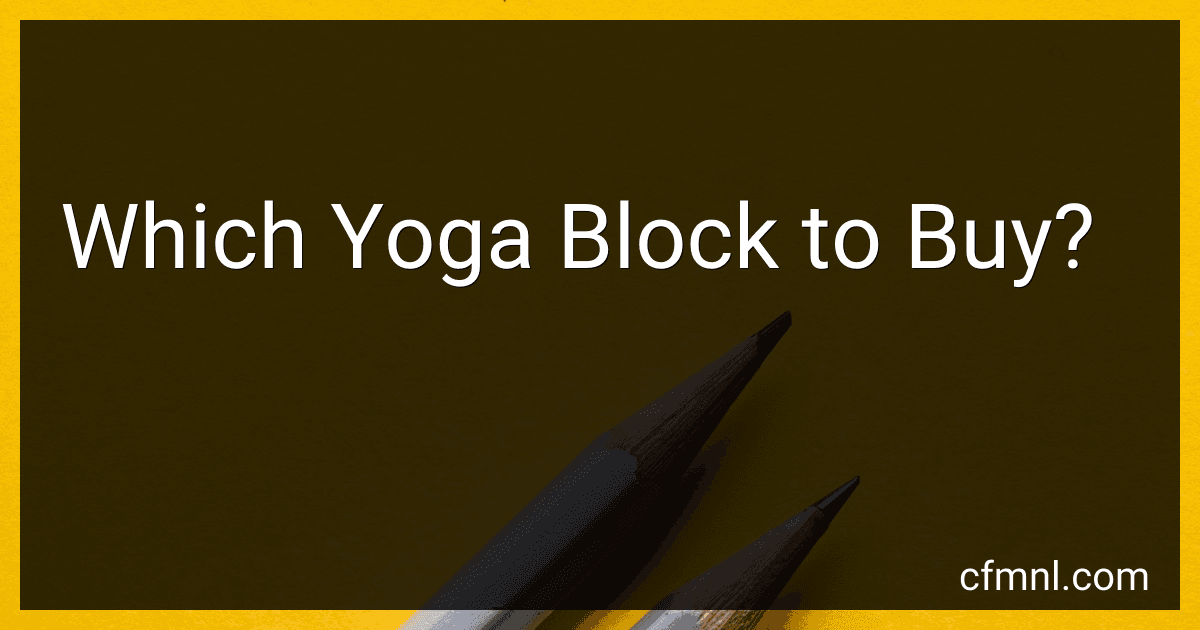Best Yoga Blocks to Buy in February 2026
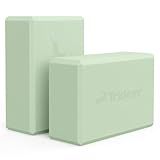
Trideer Yoga Block, Soft Non-Slip Surface Premium Foam Blocks, Supportive, Lightweight, Odorless, Yoga Accessories for Pilates Meditation General Fitness Stretching Toning (Mint Green-2 Pack)
- ENHANCED COMFORT: PREMIUM FOAM BLOCKS ENSURE STABILITY AND SOFTNESS.
- INJURY PREVENTION: RELIABLE SUPPORT REDUCES STRAIN AND MAINTAINS ALIGNMENT.
- VERSATILE USE: IDEAL FOR ALL SKILL LEVELS TO DEEPEN STRETCHES AND BUILD STRENGTH.


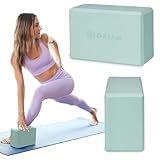
Gaiam Yoga Block - Supportive Latex-Free Eva Foam - Soft Non-Slip Surface with Beveled Edges for Yoga, Pilates, Meditation - Yoga Accessories for Stability, Balance, Deepen Stretches
- ENHANCE YOUR PRACTICE WITH STABILITY AND OPTIMAL ALIGNMENT.
- LIGHTWEIGHT, DURABLE FOAM FOR EASY TRANSPORT AND DAILY USE.
- NON-SLIP DESIGN ENSURES A SECURE GRIP FOR ALL LEVELS OF PRACTICE.


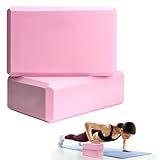
2 Pcs Yoga Blocks, 9"x6"x3" Foam Blocks Yoga Props for Pilates Stretching and Meditation Exercise Blocks Lightweight Yoga Essentials (Pink, normal)
- ELEVATE YOUR PRACTICE: IMPROVE ALIGNMENT WITH SUPPORTIVE YOGA BLOCKS!
- LIGHTWEIGHT, PORTABLE DESIGN PERFECT FOR YOGA AT HOME OR ON-THE-GO.
- EASY TO CLEAN: SMOOTH SURFACE REPELS DIRT FOR HASSLE-FREE MAINTENANCE.


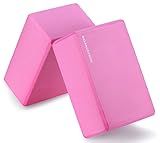
Fitvids Set of 2 High Density Yoga Blocks, 9"x6"x4" Each, Pair (Pink)
- SLIP-RESISTANT SURFACE FOR SAFE, CONFIDENT STRETCHING AND SUPPORT.
- MOISTURE-PROOF DESIGN ENHANCES YOUR STRETCHES, FITTING ALL FITNESS LEVELS.
- DURABLE, EASY-TO-CLEAN FOAM BLOCKS PERFECT FOR HOME OR GYM USE.


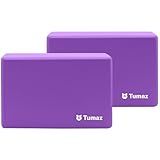
Tumaz Non-Slip Yoga Blocks 2-Pack - High Density/Lightweight EVA Foam & Natural Cork for Stability, Premium Set with E-Book Included
- PREMIUM FOAM OFFERS SOFTNESS AND STABILITY FOR ALL POSES.
- VERSATILE DESIGN ENHANCES SUPPORT AND COMFORT DURING STRETCHES.
- IDEAL FOR YOGIS OF ALL LEVELS TO IMPROVE PRACTICE AND ALIGNMENT.


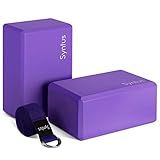
Syntus Yoga Block and Strap Set, 2 EVA Foam Soft Non-Slip Blocks 9×6×4 inches, 8FT Metal D-Ring Strap for Yoga, General Fitness, Pilates, Stretching and Toning
- COMPLETE SET: 2 YOGA BLOCKS + 8FT STRAP & GUIDE FOR ALL SKILL LEVELS.
- ECO-FRIENDLY FOAM: DURABLE, LIGHTWEIGHT, NON-TOXIC EVA FOAM BLOCKS.
- ENHANCED FLEXIBILITY: ADJUSTABLE STRAP DEEPENS STRETCHES & BOOSTS RECOVERY.


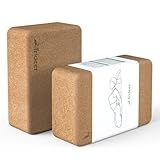
Trideer Cork Yoga Blocks, 2 Pack Natural Cork Blocks, High Density with Non Slip Surface, Eco-Friendly Accessories and Ideal for Yoga, Pilates, Stretching
-
ECO-FRIENDLY CORK: SUSTAINABLE, RENEWABLE MATERIAL SAFE FOR FAMILIES.
-
SUPERIOR STABILITY: HIGH-DENSITY DESIGN ENSURES FIRM, NON-SLIP SUPPORT.
-
VERSATILE USAGE: IDEAL FOR YOGA, MEDITATION, AND VARIOUS FITNESS ACTIVITIES.


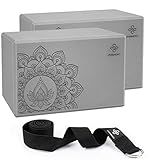
Overmont Yoga Block 2 Pack Supportive Latex-Free EVA Foam Soft Non-Slip Surface for General Fitness Pilates Stretching and Meditation 9"x6"x3" Yoga Strap Included
- LIGHTWEIGHT & PORTABLE: CARRY YOUR YOGA BLOCKS ANYWHERE WITH EASE!
- HIGH-DENSITY COMFORT: ENJOY FIRM YET SOFT SUPPORT FOR ALL POSES.
- ENHANCE YOUR PRACTICE: PERFECT FOR BEGINNERS AND PROS TO ALIGN POSES.


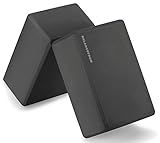
Fitvids Set of 2 High Density Yoga Blocks, 9"x6"x4" Each, Pair (Black)
- SLIP-RESISTANT DESIGN FOR A SECURE GRIP DURING EVERY STRETCH.
- MOISTURE-PROOF BLOCKS DEEPEN STRETCHES AND IMPROVE POSTURE.
- DURABLE, EASY-TO-CLEAN FOAM PERFECT FOR HOME OR GYM USE.


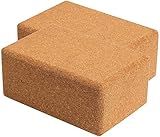
Cork Yoga Blocks 2 Pack Set -Natural Cork from Portugal, 9"x6"x4" Yoga Blocks Non-Slip&Anti-Tilt for Women| Men, Lightweight, Odor-Resistant| Moisture-Proof, Perfect Yoga Equipment
-
ECO-FRIENDLY CORK: DURABLE, NON-SLIP, AND EASY TO CLEAN YOGA BLOCKS.
-
ERGONOMIC DESIGN: ROUND EDGES ENSURE A SECURE GRIP FOR ALL PRACTICE LEVELS.
-
SATISFACTION GUARANTEED: 180-DAY REFUND POLICY FOR WORRY-FREE SHOPPING.


When it comes to choosing a yoga block, there are several factors to consider. First and foremost, it's important to determine the material of the block. Yoga blocks are typically made from foam, cork, or wood. Foam blocks are lightweight, affordable, and provide a soft surface for support. Cork blocks are eco-friendly, offer a firm grip, and are durable. Wood blocks are also sturdy and tend to be heavier, providing a stable foundation.
Another aspect to consider is the size of the yoga block. Most blocks come in standard sizes of 9x6x4 inches, but there are also larger and smaller options available. The choice ultimately depends on your personal preference and the purpose of the block. Taller individuals or those with limited flexibility may find a larger block more comfortable, while smaller blocks are more portable and easier to handle.
The shape of the block is another important aspect to consider. Most yoga blocks are rectangular, but some brands also offer circular or square blocks. Rectangular blocks are the most common and versatile, providing stability for various poses and support during different parts of the body. Circular blocks are great for adding extra challenge and variety to your practice, while square blocks work well for specific poses that require a different shape.
Price is also a factor to take into account. Yoga blocks can range in price depending on the brand, material, and quality. Foam blocks tend to be the most affordable option, while cork blocks are often slightly more expensive. Wood blocks are typically the most expensive due to their durability and quality. It's important to find the right balance between price and quality.
Lastly, it's always a good idea to read reviews and do research before purchasing a yoga block. Hearing feedback from other practitioners can help inform your decision and ensure that you choose a block that suits your specific needs and preferences. Ultimately, the best yoga block for you is one that feels comfortable, supports your practice, and enhances your overall yoga experience.
How to select a lightweight yoga block for travel?
When selecting a lightweight yoga block for travel, consider the following factors:
- Material: Look for blocks made from lightweight materials like foam or cork. These materials are durable, yet lighter compared to other options like wood or bamboo.
- Size: Consider the dimensions of the block. Opt for a smaller size that is easier to pack and carry. Look for blocks that are smaller in height and width but still provide adequate support for your practice.
- Weight: Check the weight of the block. The lighter the block, the more convenient it will be for travel. Aim for a block that weighs less than a pound.
- Portability: Look for blocks that come with a carrying strap or have a design that allows for easy transport. Some blocks have hollow cores, making them even lighter and easier to handle.
- Comfort and Stability: Though lightweight, the block should still provide stability and support during your practice. Consider the firmness and grip of the block to ensure it doesn't compromise your balance and alignment.
- Reviews: Read reviews online to see what other travelers have to say about the block's portability, durability, and performance. This can provide valuable insights into the product's suitability for travel.
- Price: Set a budget and choose a block that fits within your price range. You can find quality lightweight blocks at various price points.
By considering these factors, you can select a suitable lightweight yoga block for your travel needs, ensuring you can maintain your yoga practice wherever you go.
What is the purpose of a yoga block?
The purpose of a yoga block is to provide support and stability during yoga practice. It is a rectangular prop made of foam, cork, or wood. Yoga blocks can be used to modify, intensify, or enhance yoga poses. They help in maintaining proper alignment, deepening stretches, improving balance, and increasing flexibility. Yoga blocks are especially beneficial for beginners or individuals with limited flexibility as they assist in achieving proper alignment and engaging the correct muscles.
What is the best yoga block for taller individuals?
When it comes to choosing a yoga block for taller individuals, it's important to consider the length, width, and density of the block. Here are a few options that are generally recommended:
- Extra-Long Yoga Blocks: Look for blocks that are longer than the standard 9 inches. Some brands offer blocks that are up to 12 inches long, providing additional support and stability for taller individuals.
- Wide Yoga Blocks: Along with length, it's also beneficial to opt for wider blocks. Blocks that are wider than the standard 4 inches provide more surface area for the hands, feet, or other body parts to rest upon, offering better stability during poses.
- High-Density Foam Blocks: Taller individuals may benefit from choosing blocks made from high-density foam. These blocks are firmer than standard foam blocks, providing more stability and support, especially during weight-bearing poses.
Ultimately, the "best" yoga block for taller individuals depends on personal preferences and body proportions. Experimenting with different sizes, widths, and densities can help find the most comfortable and supportive block for individual needs.
